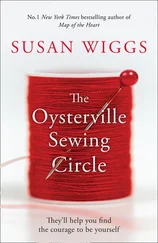The stranger set a long flat wooden box on a pair of sawhorses and lifted out what appeared to be a firearm made of pipes. Magnus clamped his jaw to keep his teeth from chattering.
“Here it is,” the Englishman said. “The STEN gun, as promised. British made, very simple and powerful. It will fire ten rounds per second. I’m told you can take it apart and make a draft of each individual piece.”
Magnus’s father nodded. He picked up a piece of the disassembled gun. “You see how this looks? It could be anything. A part for a clock. A mechanism for a tire pump. Taken bit by bit, a gun is unrecognizable. Even a trained eye would not know this is the trigger of a lethal weapon. On the sketches, each element will be measured and labeled as a sewing machine part.”
“Sewing machine?”
Papa shrugged. “As I explained, piece by piece, the production drawings will look innocent enough.”
“And you have a manufactory in place?”
Another nod. “Assuming the materials have been rounded up, we will have the resources to manufacture thousands of these.”
“Good, then—”
“I would not call it good. But necessary in these times.”
“Yes, of course. We’re all aware of that.”
Sweet drew back the curtain of the darkroom area. “The papers are ready,” he said.
“Your identity papers will designate you an apple farmer,” said Papa.
The man smiled, his eyes crinkling at the corners, and he looked pleasant, but nervous. “Back home in Shropshire, my family has an orchard,” he said.
“Appropriate, then,” said Uncle Sweet.
“You see, I’m not simply a courier of submachine guns, but a farmer,” the Englishman said. He seemed a bit defensive after Papa snapped at him.
“We all do what we must,” Sweet said.
“And you’ve done this before,” the man said. “I don’t mean to seem ungrateful, but—”
“We understand,” said Papa. “I promise, the document will be undetectable, even under scrutiny.”
“How can you make such a promise?”
“I’m a civil servant,” said Magnus’s father. “I have access to all the tools.” He brandished something that looked like an official stamp or seal. “Just use your common sense. It’s a dangerous business we’re in these days.”
“No more dangerous than letting the Nazis take over all of Europe. The Germans are bringing in munitions for storage, knowing the Allies won’t bomb Copenhagen. We can’t allow the Nazis to turn your city into a satellite of their base of operations.”
“Good man,” said Uncle Sweet. He smiled briefly, but there was always a sadness in him. Magnus supposed it was because of everything he’d lost—not just his business and his home, but his wife. Even though she had done a terrible thing, Magnus knew Sweet missed her. Sometimes at night, Uncle Sweet would get into the aquavit from Farfar’s cut crystal bottle, and he would lament that he should have taken better care of his Katya. Mama got short with him, and said Katya should have taken better care of her family.
“All right, then,” said Papa, inspecting the document they had created. “You are officially an undercover agent. Not, of course, that there is anything official about it.”
“Pray we stay that way,” said the stranger.
“It will take more than prayers,” said Papa.
The Englishman stepped into the light, and Magnus noticed that he had a deep scar angling from his jaw down the side of his neck. “Your help is appreciated,” he said quietly. “I know what you’re risking.”
“No more than you are,” Papa said, and Magnus felt a welling of pride in his chest.
“All right, then,” said Sweet. “You can leave by the back door. There’s a work barrow for you to use in tonight’s operation. Good luck.”
The three of them left the basement, their shoes kicking dust through the stairs. Magnus’s nose tickled, and he held his breath, suppressing a desperate sneeze. They seemed to take forever to leave. Just as the door shut, he burst out with the sneeze.
The footsteps outside the door stopped. “Did you hear something?” asked Uncle Sweet.
There was a long pause. “It was nothing,” Papa said.
Chapter Seven
“And that,” Magnus told his rapt listeners, “is how I learned my father and his friend Sigur—my Uncle Sweet—were involved in the resistance effort. It was quite a moment for me, finding out my mild-mannered father had a secret persona. Discovering his secret was like revealing Clark Kent’s hidden identity as Superman. Very exciting. In my mind, my father went from being an ordinary civil engineer to a war hero.”
“Your father claimed he wasn’t risking anything more than the British guy was risking,” said Tess. “That’s not true, though. He put the whole family at risk.”
Magnus’s smile of memory disappeared. “Times were different then. Early in the occupation, life continued to seem normal for a time, so perhaps we didn’t understand the risk. It wasn’t until later that we grasped the danger and seriousness of the underground activities. In all, the Danes manufactured about ten thousand submachine guns, and many of those originated with my father’s production drawings. He drew everything down to the last detail, and then mislabeled the parts in code so they would appear to be anything but weapons. For all the Jerries knew, the drawings were entirely mundane—parts for bicycles or sewing machines. The guns were then assembled in various places throughout the city—bicycle shops, small machine shops, pump repair facilities—under the pretext of being something else altogether.”
Mac scrolled to a website on his laptop. “So these production drawings that were preserved by the Danish Historical Society were made by your father?”
“The ones labeled Bruder Petersen—Petersen Brothers—likely came from him. The Petersen brothers were two boy detectives in a series of novels we used to read as youngsters, so it was actually a nonexistent company.” He studied an enlarged drawing on the screen. “This one is labeled ‘rocker arm for pump relay.’ In actuality, it is a STEN gun trigger. I assume that after my father drew, measured and labeled each individual part, someone else was in charge of the assembly.”
Isabel exhaled a shaky breath, not even realizing she’d been holding it as she’d listened to the story. The tension her grandfather had described while hiding beneath the cellar stairs had been palpable.
On the table lay a few pictures of Magnus as a boy; she’d seen them before. He was tall and good-looking, neatly dressed and solemn, his eyes large and darkly fringed, making him appear almost too pretty for a boy. Yet as often as she’d seen the photographs, she had never quite been able to connect the teenage boy with her grandfather. Now the youngster came to life in her mind, a kid avidly reading a comic book, or looking forward to ice-skating with his friends, or crouched beneath the basement stairs, too frightened to speak up.
“That’s such an extraordinary story. Why have you never told me this before?” she asked him.
He reached across the space between them, patted her hand. “Life is long,” he said. “I have so many moments to remember, large and small, and I haven’t thought about that incident in decades. I suppose, considering what came after my discovery in the basement, it never occurred to me that this would be of interest to you. Or to anyone.”
“Of course it is,” Tess assured him. “Your father and his friend must have been incredible.”
“I’m sure they regarded themselves as ordinary men, simply doing what was right in order to live with themselves. But yes, they were heroes in my eyes.”
“In anyone’s eyes,” said Isabel. “I like to think I’d be that kind of person, the one who would dare to put myself at risk.”
Читать дальше












